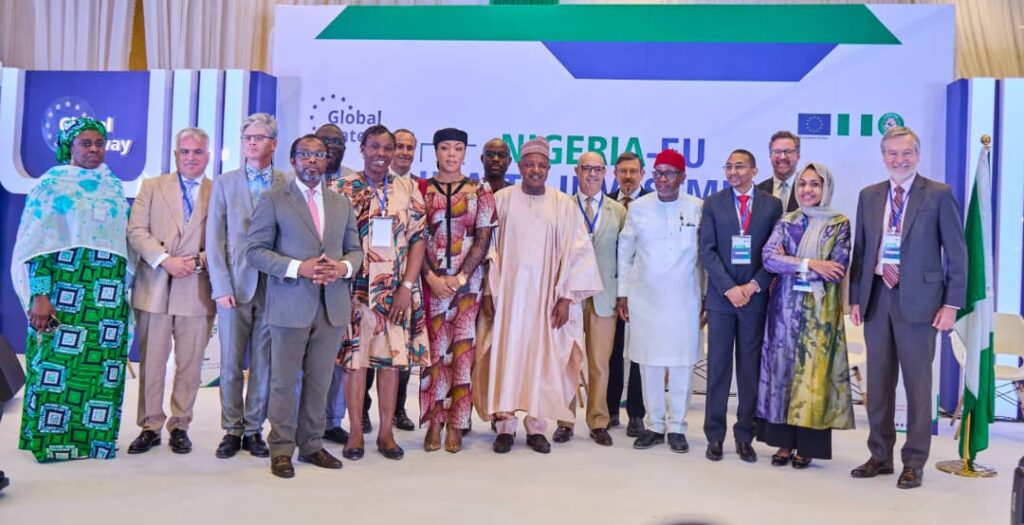In a major step toward transforming Nigeria’s health sector, the Federal Government, the European Union (EU), and the Economic Community of West African States (ECOWAS) have signed three landmark agreements aimed at boosting local manufacturing, attracting investments, and strengthening reproductive health and rights across West Africa.
The agreements, Enabling Local Manufacturing of Health, Immunisation and Nutrition Commodities in Nigeria (ELM-N), Quality Uplift for Advancing Local Industry in Medicine Standards (Qualimeds Nigeria), and Strengthening Reproductive Health and Rights (SRHR) in West Africa are part of the EU’s Global Gateway Manufacturing and Access to Vaccines, Medicines, and Health Technologies (MAV+) initiative and SRHR flagship programmes.
Speaking at the Nigeria-EU Health Investment Forum on Thursday in Abuja, Vice President Kashim Shettima said the agreements reaffirm the Federal Government’s commitment to building a sustainable, innovation-driven health economy.
Represented by Dr. Uju Rochas, Senior Special Assistant on Public Health, Shettima stressed that the administration remains steadfast in creating an enabling environment for investors and innovators through predictable regulations, strong institutions, and public-private collaboration.
He said: “Through the Presidential Initiative for Unlocking the Healthcare Value Chain (PVAC) and complementary frameworks such as the Sector-Wide Approach (SWAp), this administration has taken concrete steps to strengthen health governance, stimulate investment, and promote local manufacturing.”
Reiterating Nigeria’s commitment to private-sector partnership, Shettima added: “Our message is clear: Nigeria is open for health investment, innovation, and impact. The President has declared that Nigeria’s health transformation will not be driven by aid and dependency alone, but by government-led ownership, accountability, and innovation — made in Nigeria, for Nigerians, and by Nigerians.”
He commended the EU, PVAC, NIPRD, and other partners for advancing health security, technology transfer, and industrialisation. “Today marks the beginning of a new chapter — one defined by shared prosperity, local innovation, and global collaboration,” he said.
EU Ambassador to Nigeria and ECOWAS, Gautier Mignot, described the forum as a demonstration of Team Europe’s shared commitment to improving health across borders through strategic investment.
“Working alongside all of our partners — including the Nigerian authorities, the United Nations, the wider international community, and the private sector — we must build robust, resilient, and efficient health and social welfare systems to ensure prosperity for all,” he said.
He noted that the EU has been a long-standing partner of Nigeria and ECOWAS in health, supporting access to services, large-scale immunisation, polio eradication, medical research, and family planning through both national and multilateral programmes.
“We continue to support Nigeria through our Global Gateway initiatives, particularly reproductive health and maternal and child health, where we have a large ongoing project of €45 million in Nigeria and almost €25 million in West Africa, funded with Agence Française de Développement (AFD) and the Gates Foundation,” he added.
Mignot further disclosed that upcoming EU initiatives include digital health and public health systems, noting that the EU’s focus has shifted “from aid to peer-to-peer collaboration” and toward “a dynamic investment strategy.”
Minister of Budget and Economic Planning, Sen. Abubakar Bagudu, said the forum aligns with Nigeria’s reform agenda to make healthcare more accessible and affordable.
“Nigeria’s absorptive capacity is enormous. With the right partnerships and reforms, both the EU and Nigeria stand to gain mutually from this cooperation,” he stated.
Also speaking, Minister of Health and Social Welfare, Prof. Muhammad Ali Pate, represented by Dr. Olubunmi Aribeana, reaffirmed Nigeria’s commitment to strengthening local pharmaceutical production.
He said Nigeria aims to ensure that made-in-Nigeria health products serve not only its citizens but also the entire West African region and beyond.
“Nigeria’s Renewed Hope Health Agenda is anchored on three pillars: strengthening local production of health and pharmaceutical products, expanding access to essential medicines and vaccines, and advancing sexual and reproductive health rights.
“As part of Universal Health Coverage, local production of health commodities is not merely an economic choice; it is a strategic health security priority,” he said.















